Understanding the different grammar rules associated with the prepositions in “independent from” and “independent of” is going to help you level up your English skills. Which preposition is used with independent? In this article, we’ll find out (and include some statistics to help).
“Independent From” Or “Independent Of”: Which Is Correct?
“Independent of” is the correct spelling. You should use it when you’re talking about something that is no longer influenced or controlled by something else. “Independent from” is an incorrect spelling, but it’s also a common mistake that native speakers make.
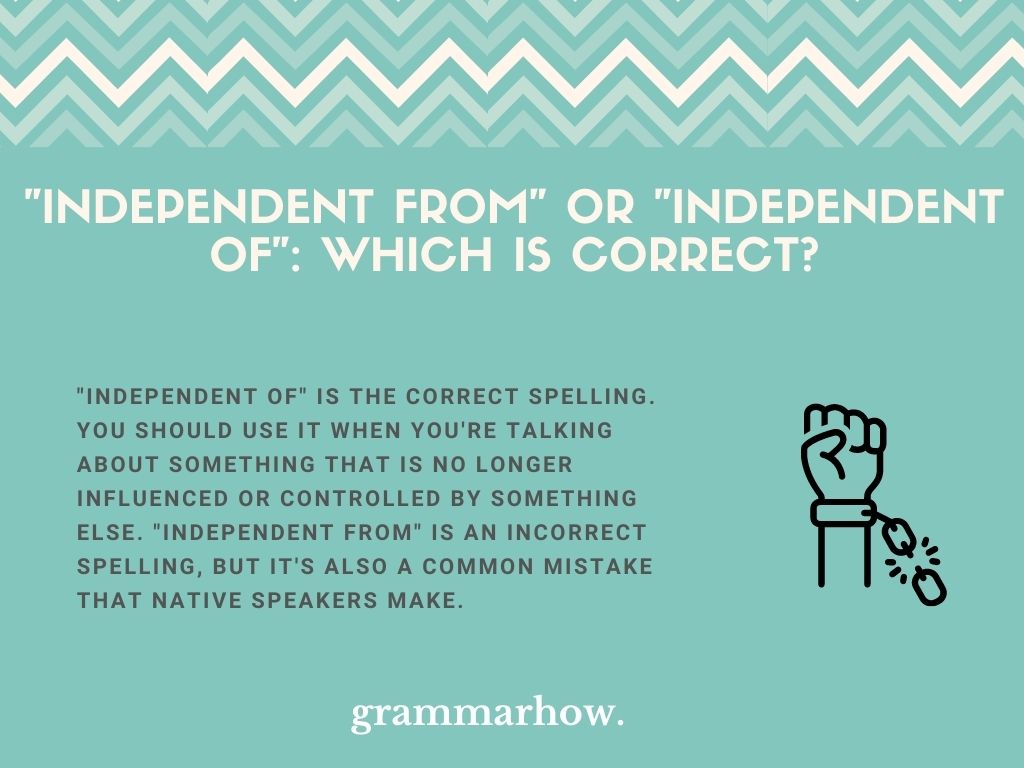
According to The Cambridge Dictionary, the definition of “independent” is “not influenced or controlled in any way by other people, events, or things.”
We can also look at this graph to see the difference in popularity between the two phrases. “Independent of” is by far the most popular choice (and the only one that’s correct). However, over the last few decades, “independent from” has slowly begun to climb.
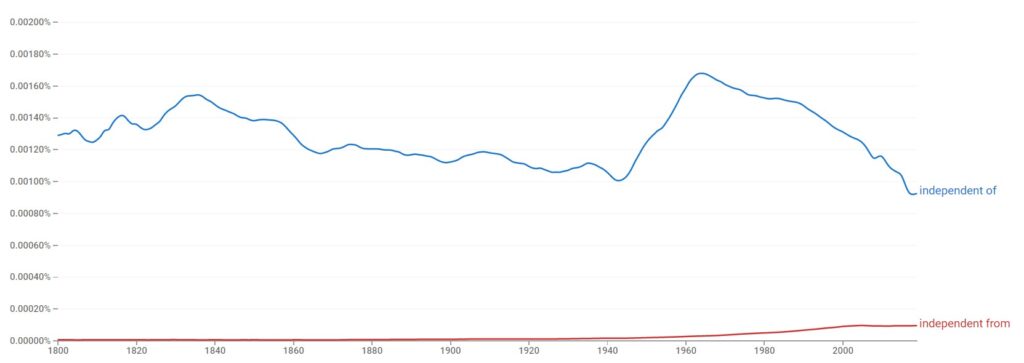
To add to those statistics, according to Google, “Independent of” is mentioned 17,100 times on The New York Times website, while “Independent from” is mentioned 2,510 times.
While “independent from” is incorrect, it’s still used in English. It’s a common mistake that people believe to be correct.
Is The Correct Choice Different In American English And British English?
We can go even further by showing you more statistics related to each country that uses it. Sometimes, different English-speaking countries (like the US and the UK) use different prepositions or words for the same meanings.
Both American English and British English use “independent of” as the correct choice. Neither of them recognizes “independent from” as correct.
If you need further evidence, here’s a graph showcasing the usage in American English. The trend line for “independent of” is almost identical to the graph we saw earlier. “Independent from” rarely gets used.
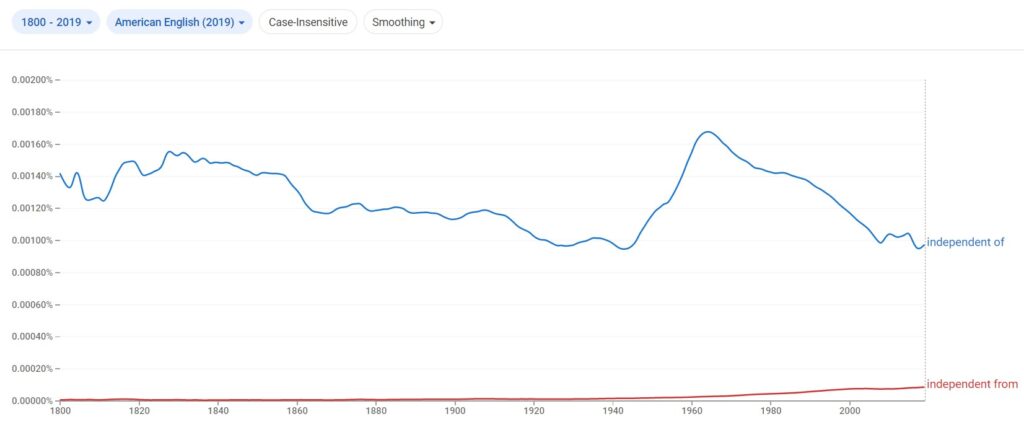
We can also look at this graph using British English data. The trend line is different because there are fewer overall results in British English, but that doesn’t mean that “independent of” is any less popular.
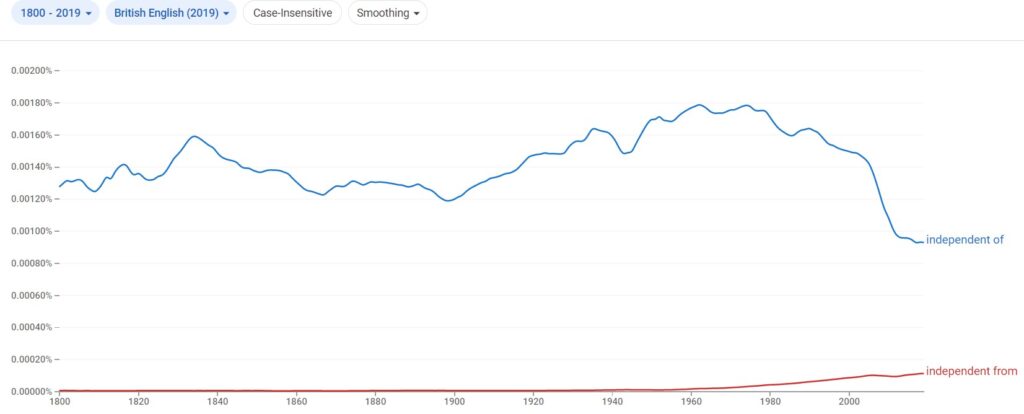
In either case, “independent from” is still occasionally mentioned. Whenever this happens, it’s mainly because the writer has confused the prepositions and believes “independent from” to be correct.
Example Sentences With Independent From Or Of
Let’s go over some example sentences using the two forms. We want to cover both “independent from” and “independent of,” so we’ll mark them as incorrect and correct, respectively. That way, you’ll see which sentences are right and which ones are wrong.
- Correct: He is independent of his duties.
- Incorrect: They all decided to say the same thing, independent from each other.
- Correct: It’s incredible how often we can agree on things so independently of each other.
- Incorrect: We usually make decisions independent from the others.
- Correct: Can you work independent of the company, or do you need further help?
- Incorrect: Are you able to do all of that independently from the people who care for you?
- Correct: Why do you insist on being independent of the people who love you?
- Incorrect: We, as a country, are independent from all the oppressors.
- Correct: We’ve worked hard to be independent of any colonial ties.
- Incorrect: You’ll never be independent from the strains of your life.
As you can see, “independent of” is always the correct preposition to choose. That’s because “independent” refers to someone gaining control from themselves, and “of” is used to show where that control came from.
“From” as a preposition means that someone is going to or coming away from something. There is no physical movement related to gaining independence, which is why “independent from” is never correct to use.
Does The Rule Also Count For “Independently From” Vs. “Independently Of”?
So, what happens if we use the word “independently” instead of “independent?” Well, if you’ve been paying attention, you might have noticed that some of the previous examples already use the word “independently.”
“Independently of” is still the correct spelling here. The same rules apply with “independently” as they did with “independent.” There are no other ways to use “independently from” separately.
To show this with statistics, take a look at this graph. While neither phrase is as popular as “independent of,” “independently of” is still the most popular choice of the two as it’s the only correct variation.
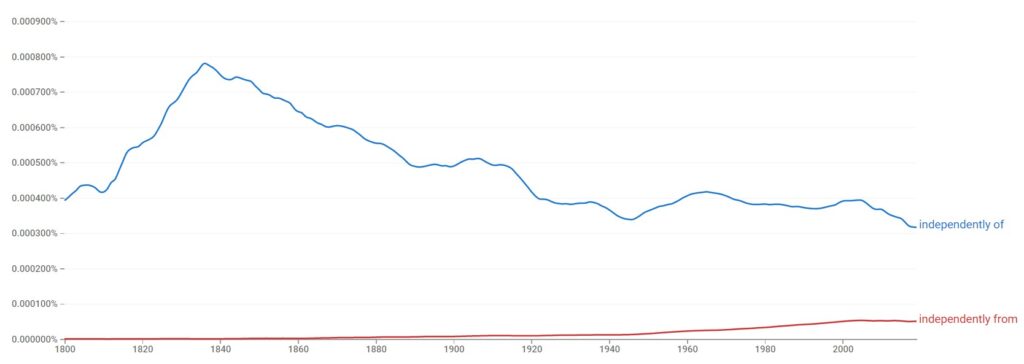
However, people still commonly make a mistake with “from” even when they use “independently.” That’s why “independently from” still has some usage on that graph. Many people believe “from” to be a useful preposition in this case.
Just like with “independent from,” we’re still not moving away or going towards anything when talking about independence. For that reason, “from” is always incorrect.
Is It Independent From Or Of Each Other?
So, to finish up the article, we want to go over the two most easily confused phrases. We will see a lot of people use “independent from” when they’re saying “each other” after it.
“Independent of each other” should be used when you’re talking about someone doing something without influence from any other person.
- We worked independently of each other.
- We are always independent of each other.
We included both “independently” and “independent” here to show you that “of” is always the correct choice to make.
Is It Independent From Or Of One Another?
What about when we use “one another?” To be honest, “one another” and “each other” are synonymous in this case, so the explanation is much the same as you’ve already seen throughout this article.
“Independent of one another” is the correct spelling. You should use it when you want to say that two people worked on something without each other’s influence.
The only major difference is that “one another” usually refers to two people (though it can also mean more), while “each other” tends to mean more than two people (though it can still mean two). That’s why they work as synonyms for each other.
- We should conduct this experiment independently of one another.

Martin holds a Master’s degree in Finance and International Business. He has six years of experience in professional communication with clients, executives, and colleagues. Furthermore, he has teaching experience from Aarhus University. Martin has been featured as an expert in communication and teaching on Forbes and Shopify. Read more about Martin here.
